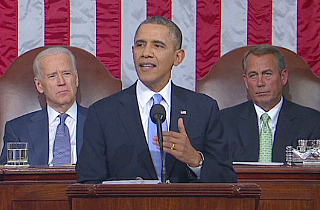Obama’s MyRA Idea Is Redistribution of Wealth from Workers to Money Managers
 In his State of the Union address, President Obama pulled one of his signature moves, proposing a windfall for finance in the guise of attempting to address working class concerns.
In his State of the Union address, President Obama pulled one of his signature moves, proposing a windfall for finance in the guise of attempting to address working class concerns.
“Today, most workers don’t have a pension,” he rightly pointed out. “A Social Security check often isn’t enough on its own. And while the stock market has doubled over the last five years, that doesn’t help folks who don’t have 401(k)s.”
His proposed solution, “MyRA” (which name reeks of obscurantism), is just like the rest of our savings regime: It unnecessarily skims off of workers’ wages so money managers can extract fees.
According to the White House’s policy briefing sheet, MyRAs are “a new simple, safe and affordable ‘starter’ retirement savings account.” They will provide workers “a place to invest their hard-earned savings that provides an appropriate balance of risk and return.” (What is the appropriate risk of impoverishing old people?) It sounds basically like a savings bond — in that it’s government-insured — except that “financial advisers” will be able to invest the money in whatever they want.
Time was, American pensions were “defined benefits” that paid out reliable sums. Then the 1980s happened, and everybody’s “nest egg” started getting turned over to the Wall Street snakes in the form of 401(k)s and IRAs. Today, these plans hold roughly $10.5 trillion in total assets — the workers effectively own the means of production, albeit as minority shareholders. Except, entrusting the working class’s savings to Wall Street gamblers hasn’t led to actual investment in new means of production and new hiring of workers (i.e., creating economic growth). Instead, the finance sector’s preferred activity is just swapping existent assets in order to suck as much wealth as possible out of the economy for executives and major shareholders.
Because these retirement accounts arose in an age of virtually uninterrupted deregulation, the “advisers” in charge of investing the working class’s savings do not have a fiduciary responsibility to the savers. You read that right: the money managers are not legally responsible to the people whose wages are being withheld for savings. There are no conflict-of-interest rules, meaning advisers can “self-deal” (invest in companies they themselves have shares in) and pay themselves exorbitant fees, at the expense of workers. The result is that nearly two-thirds (!) of profits from retirement accounts are extracted by the financial services “industry.” Demos estimates that a median-income, two-earner household loses, on average, $155,000 to money managers over the course of their lifetime.
Here’s the most offensive thing about it: We don’t actually need to save any dollars at all. When my generation reaches retirement-age, we may have a shortage of food or hospital beds or something else crucial to retirees, but we will not have a shortage of dollars. Food is a real thing that can run out; dollars are not. By far the vast majority of dollars are just digital entries in spreadsheets, spent into existence by the federal government by a keystroke. If we can marshal the real resources to provide everyone with a dignified retirement, we can type the number of dollars they cost into existence – no money-saving necessary.
That is why young people should not be fooled into thinking that Social Security is in any danger. All that program does is add numbers to people’s bank accounts. The trust fund is effectively just an accounting mechanism, as it could completely run out, could even find its balance negative, and it would be a very peculiar bank indeed that declined a transaction from the United States Treasury.
It is only for political — not economic — reasons, according to President Franklin D. Roosevelt, that the trust fund is filled by a payroll tax: “We put those payroll contributions there so as to give the contributors a legal, moral, and political right to collect their pensions and unemployment benefits,” he said. “With those taxes in there, no damn politician can ever scrap my social security program.”
Operationally, however, FICA taxes are an unnecessary withholding of wages. The government doesn’t actually need that money to pay social security. It is fully capable of eliminating this regressive tax burden and just paying Social Security out of the general fund.
Therefore, when a Social Security check “often isn’t enough on its own,” the optimal move is clearly to increase Social Security payments. That’s how a wealthy country should provide for its retirees: give them money so they can live in comfort. Increase social security enough and no one will need a retirement account, MyRA or otherwise. Workers can work and keep their money, and then Social Security can allow them to know comfort as they grow old.
Infuriatingly, the president could have argued for just that very thing, since support is gathering behind increasing social security, bolstered greatly by Sen. Elizabeth Warren’s recent remarks. Alas, that is not the Obama way. He’d much rather push a lousy program consistent with a lousy system that yields lousy outcomes.
Behold: the audacity of hope.
— —
Jesse Myerson is a writer and activist from New York City. He co-hosts the radical finance and economics podcast “Disorderly Conduct” and tweets as @JAMyerson.
This is an opinion piece. The views expressed in this article are those of just the author.
New: The Mediaite One-Sheet "Newsletter of Newsletters"
Your daily summary and analysis of what the many, many media newsletters are saying and reporting. Subscribe now!






Comments
↓ Scroll down for comments ↓